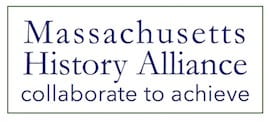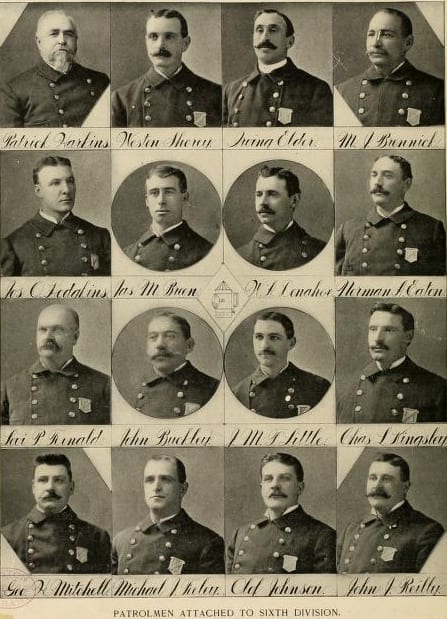 What: 2019 Mass History Conference
What: 2019 Mass History Conference
When: Monday, June 24, 2019 | 8:30 a.m. – 4:00 p.m.
Where: Hogan Campus Center, College of Holy Cross, Worcester, Mass.
The 2019 Mass History Conference will focus on empowering our communities and organizations in preserving and telling the many stories of the towns and people of Massachusetts. Learn more about the conference here.
Staff from University Archives & Special Collections in the Healey Library at UMass Boston will be presenting as part of two sessions at the 2019 Mass History Conference:
ENGAGING COMMUNITIES WITH PARTICIPATORY RESEARCH: The 1919 Police Strike and Lawrence World War I Memory Projects
Presenters: Jessica Holden, University Archives & Special Collections, Healey Library, UMass Boston, and Marc Laplante, Lawrence WW1 Project Lawrence History Center; Moderator: Caroline Littlewood, University Archives & Special Collections, Healey Library, UMass Boston
Learn how communities are engaging residents in their local history through crowd-fueled research and innovative technology. Presenters will share their research models, training MOOC software, and other technology to help others create community-based research projects. The 1919 Boston Police Strike Project documents and preserves the stories of the more than 1,100 police officers who were involved in this highly influential labor strike which had lasting effects in the City of Boston and across the United States. Project team members will provide an overview of the history, structure, and current status of the project; speak to how they have recruited, trained, and retained volunteers; discuss challenges and successes; and examine how this project may serve as a model for other crowd-fueled local history projects. Through his passion and creativity, Marc Laplante tells the stories, and brings to life, the 35 Lawrence residents who received official recognition with a bridge, park, pool, street corner or buildings for their deaths in World War I.
Skills To Go: CRAFTING PHASE BOXES
Presenter: Meghan Bailey, University Archives & Special Collections, Healey Library, UMass Boston
Help improve access to important archival collections at your repositories. Learn to create custom enclosures, also known as phase boxes, for items in manuscript collections. This is a unique, hands-on opportunity to learn a skill and be exposed to interesting, historic materials from University Archives and Special Collections in the Joseph P. Healey Library at UMass Boston. The types of materials and resulting enclosures will vary greatly in size, age, and format. Training will be provided to participants, and no prior experience is needed. UASC will provide a limited* amount of books in need of enclosures. Instructions will be provided so you may create the enclosures at your institution.
View the full program for the Mass History Conference and register here.
2019 CONFERENCE SUPPORT AND SPONSORSHIPS
Presented by
Massachusetts History Alliance
Mass Humanities
Supported by
Massachusetts State Historical Records Advisory Board (MA SHRAB)
University of Massachusetts Amherst Program in Public History
University of Massachusetts Boston Public History and Archives Tracks
Joseph P. Healey Library at UMass Boston
Supporters: Daedalus, Inc., Museum Textiles Services, Boston Rare Maps
Supporting Members: Dorchester Historical Society, Northeast Document Conservation Services
Supporting Associates: Robert Forrant, Mike Potaski
Contributing Members: Freedom’s Way National Heritage Area, House of the Seven Gables, Waterworks Museum, Digital Commonwealth, Tsongas Industrial History Center, Massachusetts Historical Society
Friends: Epsilon Associates, Inc.; Roberts Consulting; Swift River Press: Public History & Communications by Pleun Bouricius; Lynne Zacek Bassett, Costume & Textile Historian; D.P. Autio, Ornamental Plastering and Plastering of all Types; William G. Pomery Foundation
Donors: University Products
University Archives & Special Collections in the Joseph P. Healey Library at UMass Boston collects materials related to the university’s history, as well as materials that reflect the institution’s urban mission and strong support of community service, notably in collections of records of urban planning, social welfare, social action, alternative movements, community organizations, and local history related to neighboring communities.
University Archives & Special Collections welcomes inquiries from individuals, organizations, and businesses interested in donating materials of an archival nature that that fit within our collecting policy. These include manuscripts, documents, organizational archives, collections of photographs, unique publications, and audio and video media. For more information about donating to University Archives & Special Collections, click here or email library.archives@umb.edu.


